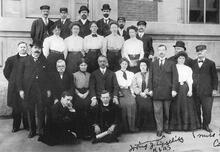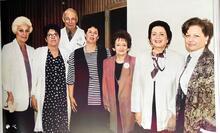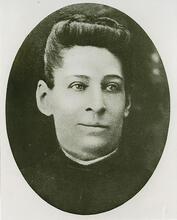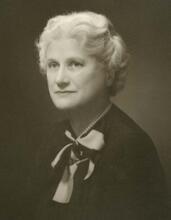Dorothy Lehman Bernhard
Dorothy Lehman Bernhard was a civic leader and philanthropist who was a staunch and tireless supporter of children in need, both through her work and more directly be becoming a foster parent. In the late 1930s, Bernhard established a fund to help distant relatives relocate from Germany and resettle in America. She worked for the Child Welfare League for 30 years, serving as president from 1957 to 1962, and chaired the Foster Home Bureau for the Jewish Child Care Association, arguing fiercely for the deinstitutionalization of child welfare. She served on national and international councils of social work and was appointed to a number of city and state committees, including New York’s state and city boards of social welfare. She was a trustee of the Federation of Jewish Philanthropies and a notable appreciator of the arts.
Dorothy Lehman Bernhard was a civic leader and philanthropist who was a staunch and tireless supporter of children in need. With roots in two of New York’s most prestigious German Jewish families, she dedicated her time, energy, and family wealth to over thirty human service, public welfare, cultural, and social organizations. Her contributions were widely recognized, including receiving the Child Welfare League of America’s first Child Welfare Award from Eleanor Roosevelt in 1962.
Early Life and Family
The oldest child of Arthur Lehman and Adele Lewisohn Lehman, Dorothy was born in New York City on April 22, 1903. She and her two younger sisters, Helen (Buttenwieser) and Frances (Loeb), grew up in a tightly knit extended family that lived, worked, socialized, and vacationed together. Although they were not particularly religious, the entire family proudly embraced Jewish values and identified very strongly with Jewish traditions of helping those in need. With models like her parents, uncles Herbert and Irving Lehman (governor and chief justice of the Court of Appeals in New York State, respectively), and grandfathers Mayer Lehman and Adolph Lewisohn (major business magnates and philanthropists), Dorothy absorbed a deep commitment to helping others and addressing social needs.
She graduated from the Horace Mann School in 1920, attended Wellesley College for one year, and married investment banker Richard Jaques Bernhard in 1923. They had two children, Robert Arthur (b. 1928) and William Lehman (b. 1931).
Work and Recognition
In the late 1930s in response to the rise of Hitler and the persecution of the Jews, the Lehman family established a fund to aid distant relatives in Germany to emigrate, and Bernhard managed these efforts, including providing direct assistance in resettlement, job finding, and addressing other social needs upon the refugees’ arrival.
Although she did not have any formal training in social work, Bernhard became deeply involved in both the provision of services and giving support and direction for the field. She was a moving force in child welfare, devoting thirty years to the Child Welfare League of America, holding the role of president from 1957 to 1962 and vice president for various terms totaling thirteen years. She served on the board of the Citizen’s Committee for Children of New York City for over twenty years and was active in the Jewish Child Care Association, where she was vice president (1940–1942) and chaired their Foster Home Bureau. Not only was she a vocal advocate for the deinstitutionalization of foster care, she also exhibited a deep personal commitment, serving as a foster parent herself.
In the field of social work, she was a board member and chair of the Hunter College School of Social Work Advisory Committee and served on national and international councils of social work. Bernhard’s contributions to these fields were also recognized through public appointments. She was a member of the New York State Board of Social Welfare from 1942 to 1947, was appointed to the New York City Advisory Board on Public Welfare by Mayor Robert F. Wagner in 1960, and served on other city and state committees.
Her diverse activities in Jewish communal organizations included being a trustee of the Federation of Jewish Philanthropies, a board member of the New York Association for New Americans, an honorary vice president of the Associated YM-YWHA’s of Greater New York (formerly known as the YMHA), a member of the publications committee of Commentary magazine, and a long-time member of Temple Emanu-El. In addition, Bernhard was a notable art collector, was a benefactor to the Metropolitan Museum of Art, was appointed to the board of the New York Philharmonic, and promoted international understanding through her fifteen-year involvement in the Institute of International Education.
Dorothy Lehman Bernhard was a leader in the field of social welfare in New York City. While her actions were rooted in Jewish values, they transcended religious and ethnic barriers. Following her death from cancer on March 6, 1969, her dedication, leadership, and unfailing concern for others, particularly children, were widely lauded.
AJYB 71:602;
Bernard, Jacqueline. The Children You Gave Us: A History of 150 Years of Service to Children. New York: Jewish Child Care Association of New York, 1973.
Bernhard, Robert A. Oral History Collection. UJA-Federation of Jewish Philanthropies of New York, 1985.
Birmingham, Stephen. Our Crowd: The Great Jewish Families of New York. 1st. Syracuse University Press ed. Modern Jewish History. Syracuse, NY: Syracuse University Press, 1996.
Buttenwieser, Helen L. Oral History Collection. UJA-Federation of Jewish Philanthropies of New York, 1977, 1982.
Loeb, John Langeloth, Frances Lehman Loeb, and Kenneth Libo. All in a Lifetime: A Personal Memoir. 1st ed. New York: J.L. Loeb, 1996.
“Dorothy Lehman Bernhard Dies; Civic Leader and Philanthropist.” The New York Times, March 7, 1969. https://www.nytimes.com/1969/03/07/archives/dorothy-lehman-bernhard-die….
WWWIA 5.
Who's who of American women: a biographical dictionary of notable living American women. 6th ed.New Providence, NJ: Marquis, 1971.






